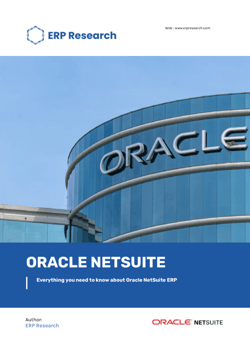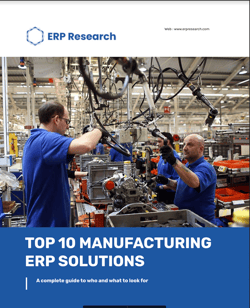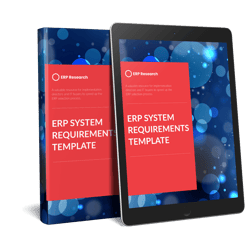Infor vs NetSuite, both vendors are two prominent providers in the enterprise resource planning (ERP) market, offering robust and scalable solutions to businesses of all sizes and industries. In this post, we'll compare the two enterprise software giants and see which is right for your business.
Infor, founded in 2002, has become known for its deep industry-specific ERP solutions. The company's software covers a wide range of sectors, including manufacturing, healthcare, retail, public sector, and hospitality. Infor’s solutions are available in both on-premises and cloud formats, and they are specifically designed with embedded best practices and regulatory compliance measures for the industries they serve.
NetSuite, founded in 1998, was one of the first companies to provide business applications through the cloud. It offers a highly configurable and scalable ERP solution that includes modules for financial management, customer relationship management (CRM), e-commerce, and professional services automation (PSA). NetSuite serves a broad range of industries, with its flexibility allowing for customization to meet specific business needs.
Modules & Functionality
Infor Functionality & Modules:
-
Industry-Specific Solutions: Infor offers ERP solutions tailored for various industries. For example, Infor LN is designed for manufacturers in automotive, industrial manufacturing, and aerospace & defense. Infor M3 caters to industries such as fashion, food and beverage, and manufacturing. This industry-specific focus ensures the software has features that precisely cater to the unique needs of each sector.
-
Manufacturing and Production: Infor's production modules provide advanced planning and scheduling, quality control, lot and serial traceability, shop floor control, and project manufacturing. It has tools for managing the complete product lifecycle from design and configure to manufacture and service.
-
Supply Chain Management: This includes advanced demand planning, procurement, supplier collaboration, warehouse management, transportation management, and analytics to deliver insights into supply chain performance.
-
Financial Management: Infor's financial suite includes functionalities for ledger and journal entries, receivables and payables management, tax management, multi-currency support, financial reporting and analytics.
-
Human Capital Management: Infor's HCM solution includes talent acquisition, goal management, learning and development, performance and talent management, and time and attendance. It also provides advanced workforce analytics.
-
CRM: Infor's CRM solution offers sales force automation, marketing automation, customer service management, and a customer experience suite to offer a complete view of every customer touchpoint across an organization.
-
Enterprise Asset Management: This includes asset management, work management, inventory control, purchasing, preventive maintenance, and inspection management.
%20Ebook.png?width=250&height=353&name=Download%20the%20Infor%20CloudSuite%20Industrial%20(SyteLine)%20Ebook.png)
Download our full Infor Guide
NetSuite Functionality & Modules:
-
Integrated Business Suite: NetSuite provides a unified platform for managing all key business processes. This includes modules for financial management, CRM, PSA, E-commerce, all in real-time and from any location.
-
Financial Management: NetSuite's financials module includes core accounting functions, billing, revenue recognition, financial planning, financial reporting, and analytics. It also offers multi-currency support and tax management capabilities.
-
CRM: NetSuite's CRM provides a complete view of customers, including information on their buying patterns and communication history. It supports sales force automation, marketing automation, customer support, and service.
-
E-commerce: NetSuite's e-commerce module includes a customizable, mobile-responsive web store, order management with integrated inventory and accounting, and real-time analytics for data-driven decisions.
-
Supply Chain and Inventory Management: This includes features for demand planning, distribution requirement planning, real-time inventory updates, and automated purchasing and vendor management.
-
Human Resources (HR): NetSuite's SuitePeople HR solution offers core HR capabilities like payroll, benefits, and time and attendance, along with performance management, employee center, and HR analytics.
-
Project Management: NetSuite's project management capabilities include project budgeting and billing, resource and task management, project templates, and timesheet and expense management.
 Download our full guide to NetSuite
Download our full guide to NetSuite
Industry Fit
Infor Industry Fit:
Infor designs its software solutions with specific industries in mind, often embedding best practices and regulatory compliance measures for those industries within its products. Here are some examples:
-
Manufacturing: Infor's software includes applications for discrete, process, and mixed-mode manufacturing, offering deep industry-specific functionality. The system provides detailed analytics and reporting options and supports various manufacturing strategies.
-
Healthcare: Infor's software for the healthcare industry covers financials, supply chain, human resources, and asset management. It is used by more than 70% of the U.S.'s top healthcare systems.
-
Retail: Infor offers a comprehensive suite of software for retail, including applications for merchandise financial planning, demand forecasting, assortment planning, and replenishment.
-
Public Sector: Infor's solutions for the public sector are designed to handle the unique needs of government, education, utilities, and transit agencies. The system supports asset management, community development and regulations, public safety, and school administration functions.
-
Hospitality: Infor has a range of solutions for the hospitality industry, including revenue management, financial management, and human capital management systems.

Read our Top 10 Manufacturing Report
NetSuite Industry Fit:
NetSuite, being a highly configurable and scalable solution, can be adopted across various industries. While it's more of a 'one-size-fits-all' ERP, it does offer functionalities to cater to certain industries. Examples include:
-
Wholesale Distribution: NetSuite is widely used in this industry for its robust inventory and order management capabilities. It can manage end-to-end supply chain processes and provides real-time visibility into the business.
-
Retail: NetSuite offers e-commerce, POS, and order management systems, as well as marketing, inventory, and financial tools for retailers.
-
Manufacturing: NetSuite can handle both discrete and process manufacturing. Its features include product data management, work order management, quality assurance, and shop floor control.
-
Services: For service-based companies, including advertising, consulting, legal, and more, NetSuite offers a Services Resource Planning (SRP) solution. It covers project management, resource management, time-and-expense tracking, and billing.
-
Non-Profit: NetSuite offers a suite for non-profits that includes accounting, donor management, e-commerce, and analytics.

Download our ERP Requirements Template
History
Infor History:
Infor was established in 2002 under the name Agilisys in Malvern, Pennsylvania. The founders, including Jim Schaper, were former executives at ERP company JBA International. In 2004, Agilisys acquired Infor Business Solutions, a German company, and changed its name to Infor.
Over the years, Infor embarked on a strategy of growth through acquisition, purchasing many industry-specific software producers. These acquisitions included companies like MAPICS (manufacturing), Lawson Software (healthcare, public sector, and human resources), and Birst (business intelligence and analytics), among others.
Infor became known for its focus on providing software with deep industry-specific functionality, often offering solutions tailored to the unique needs of different sectors. This industry-focused strategy helped differentiate Infor from many of its competitors.
As of my knowledge cutoff in September 2021, Infor was owned by Koch Industries, which first invested in Infor in 2017 and acquired the remaining equity of Infor in 2020.
NetSuite History:
NetSuite was founded in 1998 by Evan Goldberg under the name NetLedger, which originally offered web-hosted accounting software. The company was notably backed by Oracle co-founder Larry Ellison.
Over time, NetLedger evolved into a comprehensive cloud-based ERP system, and in 2003 the company changed its name to NetSuite. NetSuite was one of the pioneers in providing business applications through the cloud, well before many other providers adopted the model.
NetSuite went public in 2007, and in 2016, Oracle announced it would acquire NetSuite. The acquisition completed in November 2016.
Infor and NetSuite have different histories that reflect their different approaches to the ERP market.
Infor's history is characterized by its strategy of acquiring companies to build out its portfolio of industry-specific solutions. This has led to a wide range of products that offer deep functionality tailored to the needs of different sectors.
NetSuite, on the other hand, focused on developing a comprehensive cloud-based suite from early on. This has resulted in a more integrated, but somewhat less industry-specific, set of functionalities. NetSuite was a pioneer in the adoption of the cloud for ERP, giving it a head start in offering cloud-based solutions.
Both companies have significant backing from larger entities, with Infor owned by Koch Industries and NetSuite by Oracle. This means both have considerable resources to invest in product development and innovation.
Cost
Comparing the cost of enterprise software like Infor and NetSuite can be complex due to various factors that affect pricing. Both Infor and NetSuite typically use a subscription pricing model, with costs that vary based on factors such as the number of users, the specific modules or features required, the level of customization, and the level of support and training needed.
Infor Cost
Infor's pricing depends heavily on the specific product and the level of customization required. Because Infor offers many different products, each tailored to specific industries and company sizes, it is difficult to provide an average cost. Some solutions might start at several thousand dollars per year for a small organization, but costs can easily run into the hundreds of thousands for larger organizations or more complex implementations.
NetSuite Cost
NetSuite also uses a quote-based pricing model, which can vary widely based on the factors mentioned above. As a cloud-based solution, NetSuite typically charges based on a per-user, per-month subscription model. The base license cost starts around $999 per month with access costs around $99 per user per month, but costs can increase significantly with additional modules, users, and advanced features.
Overall, the total cost of ownership for both Infor and NetSuite will depend not only on the software license and subscription costs but also other factors such as the cost of implementation, customization, data migration, training, and ongoing support. Therefore, it's crucial to consider these elements when comparing the cost of these two systems.
Implementation
Implementing an enterprise resource planning (ERP) system such as Infor or NetSuite is a significant undertaking for any organization. The process can vary significantly depending on the specific needs of the business, the complexity of its operations, and the resources available.
Infor Implementation:
The Infor implementation process typically involves the following steps:
-
Project Planning: This initial phase includes defining project objectives, scope, and a project plan, including a timeline and resource allocation.
-
Business Process Analysis: This step involves a detailed review of the organization's current processes and systems, which is used to define the configuration requirements for the Infor system.
-
System Configuration: Based on the business process analysis, the Infor system is configured to align with the organization's requirements. This can involve configuring system settings, modifying workflows, and potentially customizing the software.
-
Data Migration: Existing data from the organization's current systems is cleaned, prepared, and imported into the Infor system.
-
Testing: The configured system is thoroughly tested to identify and fix any issues. This can include unit testing, system testing, integration testing, and user acceptance testing.
-
Training: End-users and system administrators are trained on how to use and manage the new system.
-
Go-live and Support: The system is launched and put into use. Post-implementation support is provided to resolve any issues and assist users.
NetSuite Implementation:
The NetSuite implementation process generally involves the following steps:
-
Project Planning: Similar to Infor, the implementation process starts with defining the project scope, objectives, timeline, and resource requirements.
-
Business Requirements Analysis: This phase involves understanding the business processes, workflows, and system requirements, which will guide the system setup and configuration.
-
System Configuration: The NetSuite system is set up according to the business requirements. This may involve setting up modules, defining roles and permissions, creating workflows, and customizing forms and fields.
-
Data Migration: Existing business data is cleaned, formatted, and imported into the NetSuite system.
-
Integration: If there are any third-party applications that need to be integrated with NetSuite, this is done at this stage.
-
Testing: The new system undergoes rigorous testing to ensure it works as expected. This involves unit tests, system tests, integration tests, and user acceptance tests.
-
Training: End-users are trained on how to use the NetSuite system. The training can be role-based to ensure users understand how to perform their specific job functions using the new system.
-
Go-live and Support: The system is launched, and ongoing support is provided to resolve any issues that arise.
The specifics of each implementation can vary greatly depending on the needs of the organization, the state of its existing systems, and the complexity of its operations. Also, both Infor and NetSuite offer various implementation methodologies, including traditional waterfall and agile approaches, that can be selected based on the project's needs.
Both companies also have partner networks of third-party consultants who can assist with the implementation process. Choosing the right implementation partner can be crucial to the success of the project.
Scalability
Scalability is an essential aspect of any ERP system, as it determines how well the system can grow with a business. Both Infor and NetSuite are designed with scalability in mind, but there are some differences in how they achieve this:
Infor:
-
Customization and Expansion: Infor's ERP software is designed to be easily customizable, allowing businesses to adapt the software as their needs change and grow. Additionally, Infor's wide range of industry-specific solutions means businesses can add new functionalities as they expand into new areas.
-
Cloud Infrastructure: Many of Infor's solutions are offered as cloud-based software, which provides inherent scalability. As businesses grow, they can add additional users and increase the usage of the software without the need for significant hardware investments.
-
Integration Capabilities: Infor's ERP solutions are designed to integrate easily with other software, including both Infor and non-Infor products. This means that as a business grows and adds new systems, it can integrate these systems with its Infor ERP software to ensure seamless operations.
NetSuite:
-
Module-based Structure: NetSuite's ERP software is structured as a suite of cloud-based modules, which businesses can add to as they grow and their needs evolve. This allows businesses to start with the functionalities they need and then add more capabilities as necessary.
-
Cloud-native Solution: Being a cloud-native solution, NetSuite inherently supports scalability. It can quickly accommodate an increasing number of users or transactions without the need for upfront hardware investments or installations.
-
SuiteCloud Platform: NetSuite's SuiteCloud platform allows businesses to customize and extend their NetSuite implementation. This includes creating custom fields, workflows, forms, and even entirely new applications, allowing the system to evolve and scale with the business.